

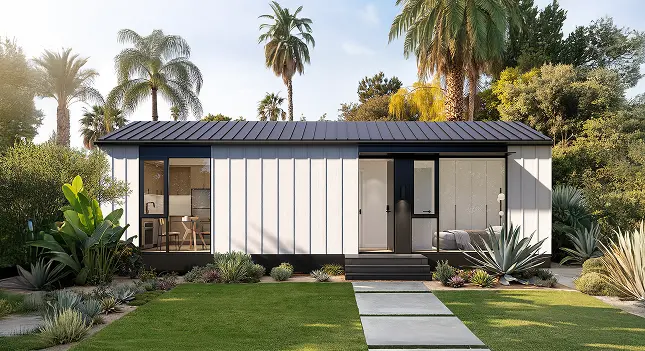
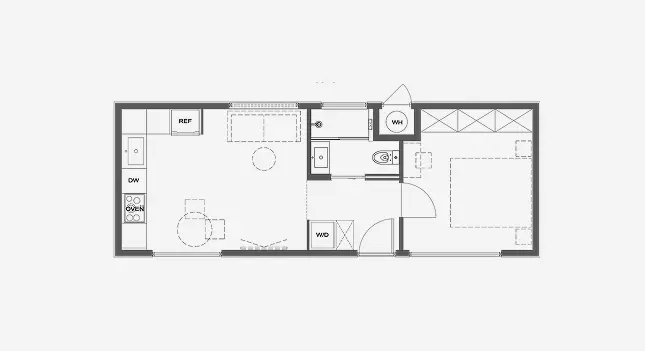
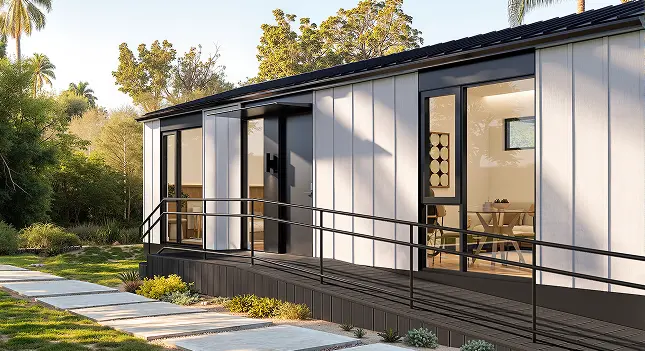
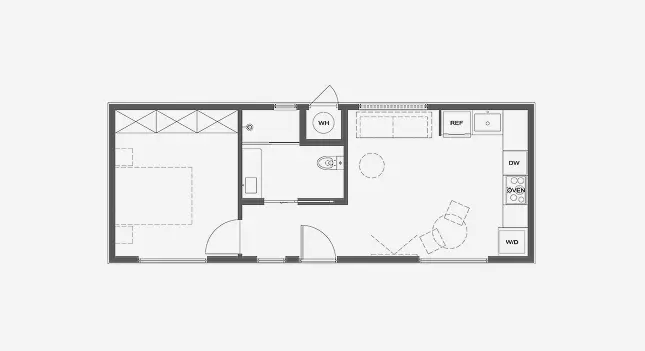





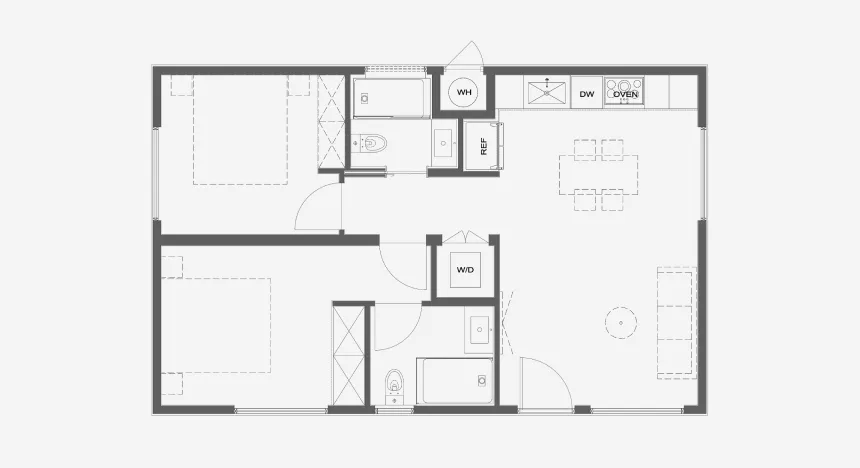

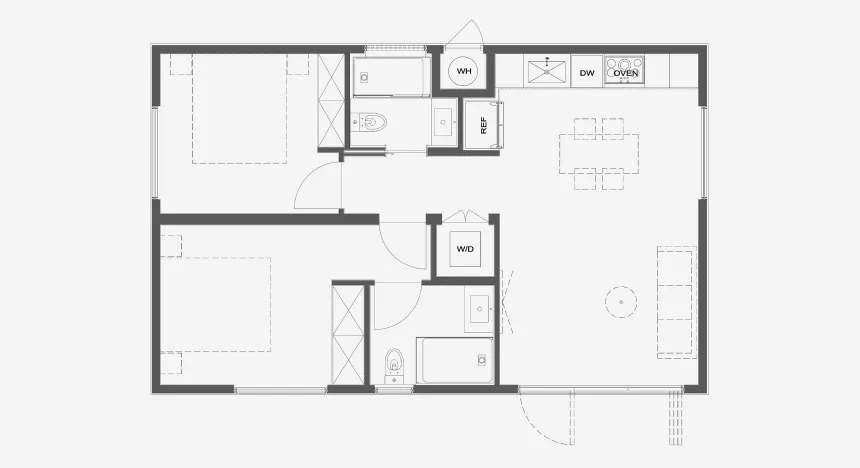

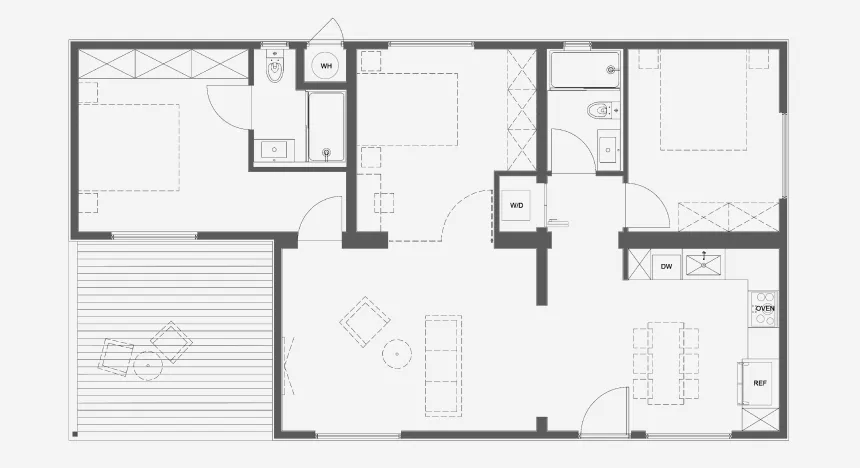
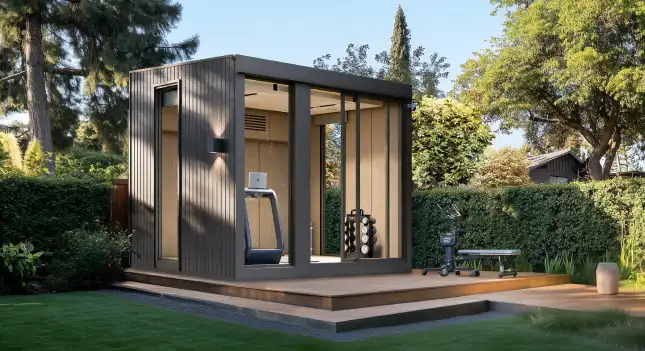




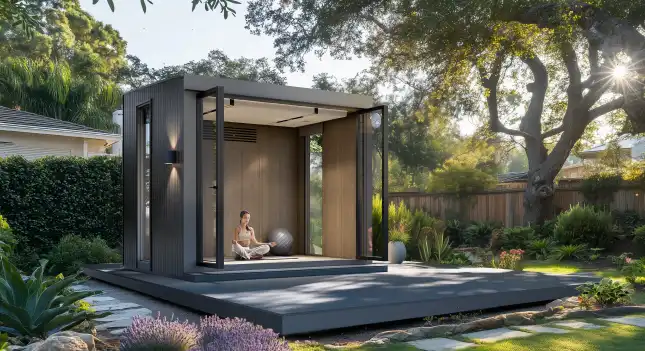

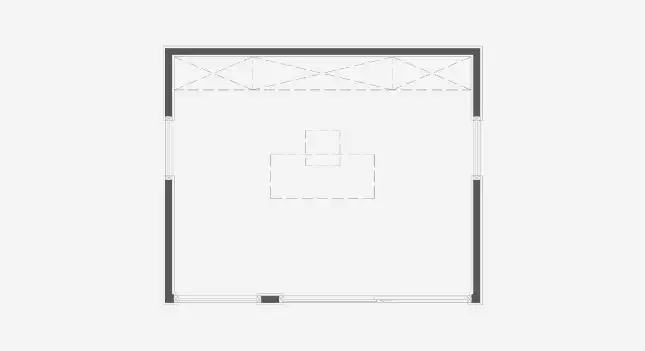
LIVELARGE SERVICES & PROCESS
- COST & PRICING
- PROPERTY & PERMITTING
- TIMELINE
- MANUFACTURING & QUALITY
- COMPANY & WARRANTY
- PERFORMANCE & SAFETY
ADU RESOURCES & LAWS
- ADU BASICS
- REGULATIONS & LAWS
- RENTAL USE
- PERMITTING & PROCESS
- PREFAB & QUALITY
- CRANE & INSTALLATION
- WARRANTY & LIFESPAN
- STRUCTURE & FOUNDATIONS
- FINANCING
- TAXES & COSTS
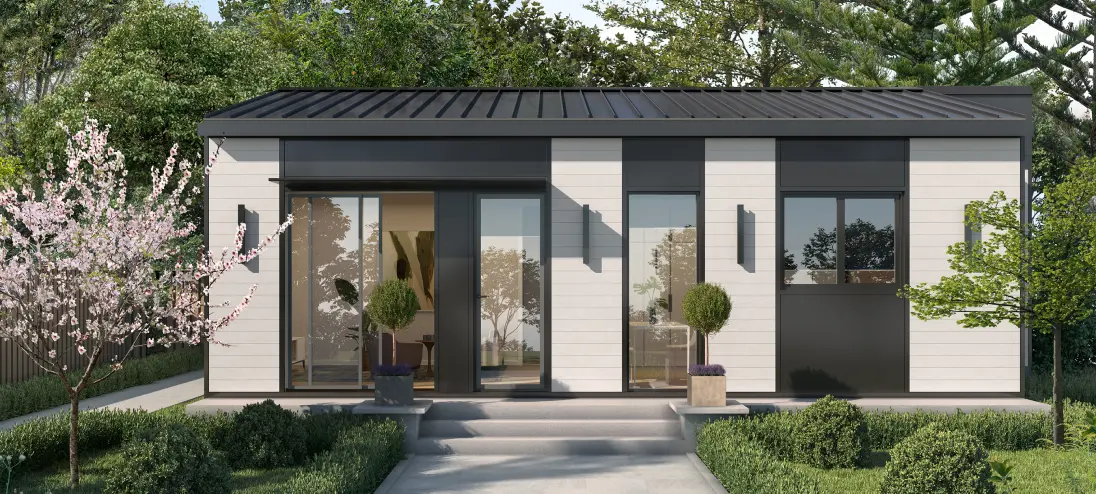
Our units start around $205,000 for smaller studios and go up to $345,000+ for larger two-bedroom layouts, plus typical site work ($40–$100+K). That price includes permitting, delivery, craning, installation, and project management — everything except utilities beyond 50 feet or unique site upgrades (like electrical panel upgrades and water line improvements).
Prefab allows us to build your home faster, with more control, and with far fewer surprises than traditional construction. Because the unit is produced in a factory, we avoid weather delays, labor variability, and the on-site complications that often extend timelines and increase costs in a stick-build project.
Prefab also delivers higher consistency in quality. Every LiveLarge unit is built in a controlled environment using steel framing, enhanced insulation, and triple-pane windows — materials chosen for durability, efficiency, and long-term performance. These details reduce maintenance, lower energy consumption, and eliminate termite-related expenses over the lifespan of the home.
The result is a smoother experience, a shorter build timeline, and a home engineered to perform — all with predictable pricing and significantly less disruption to your daily life.
Yes. We partner with financing providers who specialize in ADU projects and post-fire home rebuilds. We also support milestone-based payments during the construction process to keep cash flow flexible.
We’ve worked with a variety of loan structures to help homeowners get their projects done — from standard ADU loans to rebuild and refinance options. If you’d like to explore financing, just reach out — we can connect you with the best fit for your specific goals.
In most cases, yes — absolutely. California state law gives homeowners on single-family zoned lots the legal right to build at least one ADU, which means the answer is almost always yes.
We still offer a free feasibility check to confirm details like setbacks, slopes, easements, and terrain before you commit. If your lot happens to have unique conditions that affect the design or cost, we’ll flag them early — no surprises.
From contract to move-in, most projects take about 5–7 months. The longest phase is permitting, which varies by city. Once permits are approved, on-site construction—from foundation prep to final hookup—typically takes 6 to 10 weeks.
To break that down further:
- 2–3 weeks before delivery: we’re on-site handling foundation, trenching, and utility prep.
- Delivery day: the unit arrives and is craned into place in a single day.
- Next 3–4 weeks: we complete cosmetic finishing, appliance installs, and final inspections.
Permitting depends on your jurisdiction. Cities like Saratoga and Sunnyvale can approve plans in as little as 30–45 days, while LA County averages 2–3 months. We manage all permitting for you and maintain close relationships with many agencies to keep things moving efficiently.
All LiveLarge units are manufactured in our state-certified factories, where we have full control over sourcing, assembly, and inspection. Our California team oversees every phase of production, from design to shipping.
Our leadership team includes veterans from construction, architecture, EV manufacturing, and design — people who have been building and delivering large-scale projects for decades. LiveLarge has delivered numerous ADUs across California and is financially backed to support long-term growth. Every unit includes a comprehensive structural and finish warranty, supported by local service teams.
Our warranty covers structural components, waterproofing, insulation, and core systems. Appliances and fixtures are covered under their manufacturer warranties.
Our steel-frame units exceed California’s Wildland-Urban Interface (WUI) requirements and are built with materials selected for fire resistance and long-term safety. Every unit includes non-combustible exterior siding, tempered safety glass, aluminum window frames, and a Class A fire-rated roof, providing significantly higher protection than typical wood-frame construction.
For homeowners in higher-risk areas, we also offer upgrades such as 1-hour fire-rated exterior walls and optional fire sprinkler systems when required by your local jurisdiction or preferred for added peace of mind.
Triple-pane windows, steel framing, and precision factory construction create homes that are quieter, sturdier, and more energy-efficient. The result: a structure that feels like a high-end home, not a “prefab.” Every unit is built to last decades — with minimal maintenance and maximum comfort.
An Accessory Dwelling Unit (ADU) is a fully functional home built on the same property as an existing residence. It must include a sleeping area, kitchen, and bathroom. ADUs can be attached, converted from an existing space, or built as a separate detached structure.
At LiveLarge, we only build detached ADUs. Detached units offer the best privacy, fastest permit timelines, and cleanest installation process under California HCD approval.
ADUs have become one of California’s most effective ways to add flexible living space and long-term property value. Remote work has increased demand for guest suites, home offices, and studios. Strong rental markets make ADUs attractive income-producing assets, and adding high-quality, permitted square footage reliably boosts property value. Recent state legislation has also made ADUs significantly easier to approve and build, and cities are encouraging small-scale infill housing to address ongoing housing shortages. For many homeowners, an ADU is the most economical way to gain more space while building wealth at the same time.
Yes — especially in California’s high-demand markets. ADUs offer multiple layers of value: they provide flexible living space for remote work or multi-generational housing, add high-quality permitted square footage that increases property value, and perform well as long-term rentals in markets where demand remains strong. California’s ADU-friendly laws also make development more predictable and accessible than ever. LiveLarge can guide you through design, permitting, and cost analysis so you can maximize the return on your investment.
ADUs increase property value in several ways. They create immediate income potential through long-term, mid-term, or—where allowed—short-term rentals. They also add fully permitted square footage, which appraisers value highly. Beyond financial return, ADUs offer lifestyle flexibility for offices, guest suites, multi-generational living, or aging-in-place, all of which broaden a home’s appeal. Homes with ADUs typically attract more buyers, sell faster, and command higher prices. Prefab units like ours also shorten construction timelines and reduce uncertainty, improving both ROI and the overall homeowner experience.
California mandates streamlined rules for ADUs under 800 sq ft. Cities cannot impose additional design restrictions, and minimum setbacks are limited to 4 feet. These units can reach up to 16 feet in height, and local jurisdictions are not allowed to apply lot coverage, FAR, or density limits. For ADUs larger than 800 sq ft, cities regain some regulatory flexibility, but they must still follow state review timelines and cannot create unreasonable barriers to approval.
AB 68
Landlords can add two units to a single-family lot:
- One attached or detached ADU up to 1,200 sq ft
- One JADU up to 500 sq ft
AB 434
All cities must provide pre-approved ADU plans online by January 1, 2025.
These plans may include architect-designed options, with small fees for access or modifications.
SB 477
Consolidates state ADU and JADU laws into a single code chapter and requires cities to post processing data and reports online.
Single-family homeowners can build:
- One ADU up to 1,200 sq ft
- One JADU up to 500 sq ft
Both are allowed under current statewide standards, making ADUs more accessible.
JADUs no longer need their own private bathroom. They may share a bathroom with the primary residence as long as it’s accessible.
Yes. While ADUs are typically secondary structures, they can serve as the primary residence on a vacant lot with the correct permits.
LiveLarge also offers main-home configurations of our larger units. These include additional architectural details and code requirements while maintaining our fast timelines and high construction standards.
It depends on your city. Some jurisdictions are very short-term-rental-friendly, while others restrict stays under 30 days. In most cases, detached ADUs are the strongest performers on Airbnb and similar platforms because of their privacy and separation from the main home. Even in cities with stricter rules, ADUs consistently do well as mid-term rentals for insurance housing, travel nurses, and relocation tenants. We can help you understand your local regulations and determine the best rental strategy for your property.
Typically yes, based on city regulations. Many homeowners rent both structures independently.
We can help you navigate your specific jurisdiction’s rules.
Yes. Every ADU requires zoning review, a building permit, and the appropriate utility approvals, with some properties also needing environmental or historic review. LiveLarge manages the entire permitting process on your behalf and uses HCD-approved plans to streamline submittals, shorten timelines, and reduce uncertainty from start to finish.
ADUs come in several forms:
- Detached cottages (what LiveLarge builds)
- Garage conversions
- Basement or attic conversions
- Attached additions
- Junior ADUs (JADUs)
- Tiny homes or movable units
LiveLarge specializes exclusively in detached prefab ADUs, as they deliver the best combination of quality, value, and streamlined construction.
Prefab ADUs eliminate many of the pain points of traditional construction. Because most of the work happens in a controlled factory environment, on-site construction is reduced by up to 80%, timelines are faster, and scheduling is far more predictable. Factory production also ensures consistent quality, fixed and transparent pricing, fewer change orders, and less disruption to neighbors. LiveLarge ADUs use steel framing, triple-pane windows, double insulation, low-VOC interior materials, and undergo state inspections at the factory, resulting in a higher-performing home delivered with significantly less uncertainty.
LiveLarge delivers higher-quality homes by combining advanced materials with a fully integrated professional team.
Our units are built with steel framing for strength, fire resistance, and long-term durability; triple-pane windows for quietness, comfort, and energy efficiency; and double insulation with low-VOC interior materials for a healthier indoor environment. Every floor plan is optimized for natural daylight, and each unit undergoes rigorous HCD inspections throughout the factory build. On site, installation is completed by licensed crews trained specifically on LiveLarge units.
We also have professional architects, structural engineers, and civil engineers on staff, ensuring that design, engineering, and installation are coordinated by a single team of experts from start to finish. The result is a healthier, quieter, longer-lasting home built with precision at every stage.
LiveLarge organizes all craning. In some cases, we may require temporary access through:
- A neighbor’s property
- A school or commercial parking lot
- A shared access road
If this is needed, we’ll help coordinate a neighbor sign-off and provide all required documentation.
Homeowners are responsible for landscaping repairs. Crane operations follow strict safety measures, but due to the size of equipment and nature of access, some yard impact is possible. Most homeowners handle small repairs after installation.
Yes. Our warranty package includes:
- 10-year structural warranty (state-mandated)
- Appliance warranties provided directly by manufacturers
LiveLarge units are built under the California Residential Code (CRC) and fully inspected by California HCD. With steel framing and high-quality materials, they are designed to last as long or longer than a traditional stick-built home.
Slab Foundation:
- Concrete poured directly on the ground
- Lower cost
- Fastest to install
- Ideal for flat lots
- Limited access to plumbing and electrical after installation
Crawl Space Foundation:
- The unit sits elevated above ground
- Easier access to utilities
- Better for sloped or uneven lots
- Slightly higher cost but more flexible long-term
LiveLarge recommends the best foundation type for your soil, slope, and long-term plans.
Home equity loans and HELOCs allow homeowners to borrow against the equity they’ve built in their property. A home equity loan provides a fixed lump sum with a fixed interest rate, while a HELOC works like a revolving line of credit with flexible borrowing over time. Both options can be ideal for ADU construction because they often offer lower interest rates compared to personal loans. Homeowners can access funds to cover construction costs and repay them over a long period, making these financing solutions attractive for large projects like ADUs.
A construction loan is a short-term loan used to finance the cost of building or renovating a home. For ADUs, a construction loan can cover materials, labor, and related expenses. These loans typically convert into a permanent mortgage once the project is completed. The approval process may require documentation such as project plans, contractor agreements, and detailed budgets. Construction loans can be a flexible option for homeowners who plan to build a custom ADU or need financing tied to specific project milestones.
Cash-out refinancing allows homeowners to replace their existing mortgage with a new, larger one and receive the difference in cash. This cash can then be used to pay for ADU construction. This option can be appealing when interest rates are favorable, and homeowners want to consolidate financing within a single mortgage. However, it’s important to consider closing costs, interest rate changes, and long-term financial goals before choosing cash-out refinancing for ADU construction.
Several government programs and incentives may support ADU construction, depending on your location. These can include low-interest loans, grants, or tax credits aimed at increasing housing availability. Some states and municipalities offer additional incentives for creating affordable rental units or improving energy efficiency. Exploring available local programs can help reduce the overall cost of building an ADU.
An FHA 203(k) loan is a federal program that bundles the cost of purchasing or refinancing a home with the cost of renovating or improving it. For ADUs, this loan can cover construction expenses, including structural modifications, energy efficiency improvements, or adding new living spaces. The 203(k) loan provides a streamlined way to finance both the property and the ADU project, making it an attractive option for homeowners seeking flexible financing with lower down payments.
Choosing the right loan depends on factors such as your financial situation, project scope, and long-term goals. Evaluate the available loan types—home equity loans, HELOCs, construction loans, cash-out refinancing, and government-backed loans—to determine which best fits your needs. Consider aspects like interest rates, repayment terms, and the timeline for accessing funds. Consulting with financial experts or lenders can help you make a well-informed decision tailored to your ADU project.
Yes. Working with a financial advisor or mortgage broker can provide valuable insight into your loan options and help you navigate the complexities of financing an ADU. These professionals can guide you through interest rates, repayment terms, and eligibility requirements. Their expertise ensures you choose the most suitable financing solution based on your financial situation and project goals.
Yes. LiveLarge works with a curated list of preferred lenders who specialize in ADU and home-equity financing. Our partners include:
- CrossCountry Mortgage
- Hong Hu
- Additional vetted lenders for HELOCs and home equity loans
We can introduce you directly to lenders who understand ADU-specific financing requirements.
Sales tax applies only to the ADU unit itself, not to site work.
Your Proposition 13 protections on your main home remain unchanged.
Only the new ADU receives a new assessment. Your base home assessment stays protected.
The ADU will be assessed separately based on its construction value and size.
Your main home’s assessment does not change.
This means your overall property tax increase is modest, especially compared to buying a second property.
About Us


